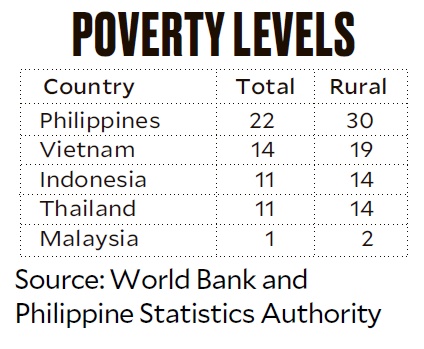Our taste buds and poverty reduction
If we take action about what our taste buds reveal when we eat a specially delicious fruit, this can help alleviate rural poverty. Each of us must do all we can, including using our taste buds, to address this serious problem. In the last Asean Business Investment Summit Open Forum, an Alyansa Agrikultura leader argued that we could not reduce Asean poverty significantly unless we improve our agriculture.
Consider the table below:
From this table, we note that our total poverty is highest among Asean-member countries. Unfortunately, our rural poverty is much worse.
Rolando Dy states that the main causes of rural poverty are inadequate product diversification and low agriculture productivity. This is where our taste buds can help. Here is an example of jackfruit providing a solution to rural poverty in Eastern Visayas. This is through a systematic process starting with taste buds ultimately resulting in product diversification, agriculture productivity and, consequently, poverty reduction.
Diversifying from not only rice and corn but also to high value products like jackfruit will increase the output value from a given level of investment. This is essentially the definition of agricultural productivity in value terms. This will in turn increase the farmers income and lessen poverty.
In Eastern Visayas, the Visayas State University (VSU) embarked on looking at the potential high value of jackfruit. Jackfruit is planted mostly on backyard scale. It had no previous scientific basis to determine which jackfruit variety would yield higher income with the same investment.
In the Department of Agriculture’s Abuyog, Samar Experimental Station, Carlos de la Cruz started collecting different jackfruit varieties. He had heard that some were much more delicious than others. He had heard that many people’s taste buds favored some varieties much more than others.
From the many varieties de la Cruz collected, he submitted the two best to the National Seed Industry Council (NSIC). After rigorous study on factors such as taste, texture and yield, the NSIC approved the variety called Eviarc (Eastern Visayas Integrated Agriculture Research Center) Sweet. Now that this is an NSIC registered variety, more people are buying this. The farmers are getting 30 percent more revenue per kilo than the nonregistered variety.
On the science and technology side, VSU’s professor Lario Lina studied the optimum flowering technology so that Eviarc Sweet could be propagated with the consistent quality and desirable characteristics. The only way to ensure this is to get scions (branches) from the original tree and graft it on to trees that do not have the same characteristics. The fruits from these grafted plants will have the same characteristics from the desirable scion, and not the original plant.
If more people used their taste buds to report to the DA-Bureau of Plant Industry (Andrea Inocencio 09954819491) where a delicious fruit comes from, the DA can send a team to look at the tree that bore this fruit. They will determine through a systematic process if this variety is superior to other varieties. If so, the DA will submit this to the NSIC for study and possible approval.
If the fruit meets the NSIC’s standards, all fruits from this variety are expected to yield an average of 30 percent more revenue per kilo compared to other varieties. However, there is a need to expand the use of this variety through grafting technology in nurseries which are investigated and accredited by the Bureau of Plant Industry. This will enable more farmers to grow a product that will result in product diversification and agriculture productivity.
So many times, we eat a delicious fruit and it ends there. If our taste buds motivate us to report this to the DA, the process of getting that fruit more widely grown and spread will result in higher farmer incomes and poverty reduction.

